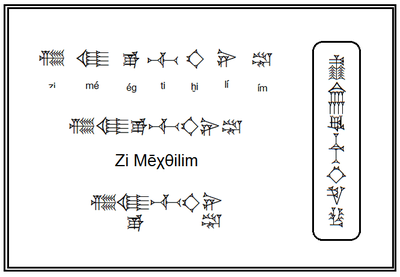Zi-Mēχθilim: Difference between revisions
Jump to navigation
Jump to search
No edit summary |
Chrysophylax (talk | contribs) m (Text replacement - "Category:Conlangs" to "Category:Languages") |
||
| (One intermediate revision by one other user not shown) | |||
| Line 3: | Line 3: | ||
The language known as '''Zi-Mēχθilim''' is a conlang being created and developed by [[User:Nicolasstraccia|Nicolás Straccia]]. It is part of the [[Yrḳuti]] conworlding project. | The language known as '''Zi-Mēχθilim''' is a conlang being created and developed by [[User:Nicolasstraccia|Nicolás Straccia]]. It is part of the [[Yrḳuti]] conworlding project. | ||
=PART I : GRAMMAR= | |||
PHONOLOGY | |||
==PHONOLOGY== | |||
Vowel inventory | ===Inventories=== | ||
====Vowel inventory==== | |||
=====Diphthongs===== | |||
Consonant inventory | ====Consonant inventory==== | ||
===Phonotaxis=== | |||
Syllable structure | ====Sandhi==== | ||
====Syllable structure==== | |||
NOMINAL MORPHOLOGY | ==MORPHOLOGY== | ||
Nominal classes | |||
Nominal cases by class | ===NOMINAL MORPHOLOGY=== | ||
Nominal determiners by class | ====Nominal classes==== | ||
PRONOUNS | =====Nominal cases by class===== | ||
Personal pronouns (I) | =====Nominal determiners by class===== | ||
Possesive determiners (I > my) | |||
Possesive pronouns (I > mine) | ====PRONOUNS==== | ||
Reflexive pronouns (I > myself) [personal pronoun]+ -nza | =====Personal pronouns (I)===== | ||
=====Possesive determiners (I > my)===== | |||
ADVERBS | =====Possesive pronouns (I > mine)===== | ||
Modal adverbs | >[possessive determiner]+-ruz ‘neni’, my > ‘neniruz’, mine | ||
VERBAL MORPHOLOGY | =====Reflexive pronouns (I > myself)===== | ||
TENSES | >[personal pronoun]+ -nza | ||
Active voice | ====Adjectives and Adverbs==== | ||
Passive voice | =====Adjectival affixes by class===== | ||
Verbal aspect markers | =====ADVERBS===== | ||
MARKING HIERARCHY | >Modal adverbs | ||
NOUS | |||
VERBS | ===VERBAL MORPHOLOGY=== | ||
Active voice | ====TENSES==== | ||
Passive voice | =====Active voice===== | ||
NEGATION | =====Passive voice===== | ||
NUMERALS | =====Verbal aspect markers===== | ||
DERIVATIONAL MORPHOLOGY | |||
LEXIKON | ===MARKING HIERARCHY=== | ||
====NOUS==== | |||
====VERBS==== | |||
=====Active voice===== | |||
=====Passive voice===== | |||
===NEGATION=== | |||
===NUMERALS=== | |||
===DERIVATIONAL MORPHOLOGY=== | |||
==SYNTAX== | |||
===Sentence structure=== | |||
==LEXIKON== | |||
==SAMPLES== | |||
==PART II : HISTORICAL LINGUISTICS== | ==PART II : HISTORICAL LINGUISTICS== | ||
PHONOLOGY of Old-ZiMe | PHONOLOGY of Old-ZiMe | ||
| Line 91: | Line 107: | ||
|} | |} | ||
[[Category: | [[Category:Languages]][[Category:A priori]][[Category:Artlangs]][[Category:Yrḳuti]][[Category:User:Nicolasstraccia]] | ||
Latest revision as of 09:44, 20 January 2017
This article is private. The author requests that you do not make changes to this project without approval. By all means, please help fix spelling, grammar and organisation problems, thank you. |
This article is a construction site. This project is currently undergoing significant construction and/or revamp. By all means, take a look around, thank you. |
The language known as Zi-Mēχθilim is a conlang being created and developed by Nicolás Straccia. It is part of the Yrḳuti conworlding project.
PART I : GRAMMAR
PHONOLOGY
Inventories
Vowel inventory
Diphthongs
Consonant inventory
Phonotaxis
Sandhi
Syllable structure
MORPHOLOGY
NOMINAL MORPHOLOGY
Nominal classes
Nominal cases by class
Nominal determiners by class
PRONOUNS
Personal pronouns (I)
Possesive determiners (I > my)
Possesive pronouns (I > mine)
>[possessive determiner]+-ruz ‘neni’, my > ‘neniruz’, mine
Reflexive pronouns (I > myself)
>[personal pronoun]+ -nza
Adjectives and Adverbs
Adjectival affixes by class
ADVERBS
>Modal adverbs
VERBAL MORPHOLOGY
TENSES
Active voice
Passive voice
Verbal aspect markers
MARKING HIERARCHY
NOUS
VERBS
Active voice
Passive voice
NEGATION
NUMERALS
DERIVATIONAL MORPHOLOGY
SYNTAX
Sentence structure
LEXIKON
SAMPLES
PART II : HISTORICAL LINGUISTICS
PHONOLOGY of Old-ZiMe Vowels Vowel inventory Dypthongues Consonants Consonant inventory Sound changes Syllable structure Writing system
PART III : CONCULTURE
|
|


